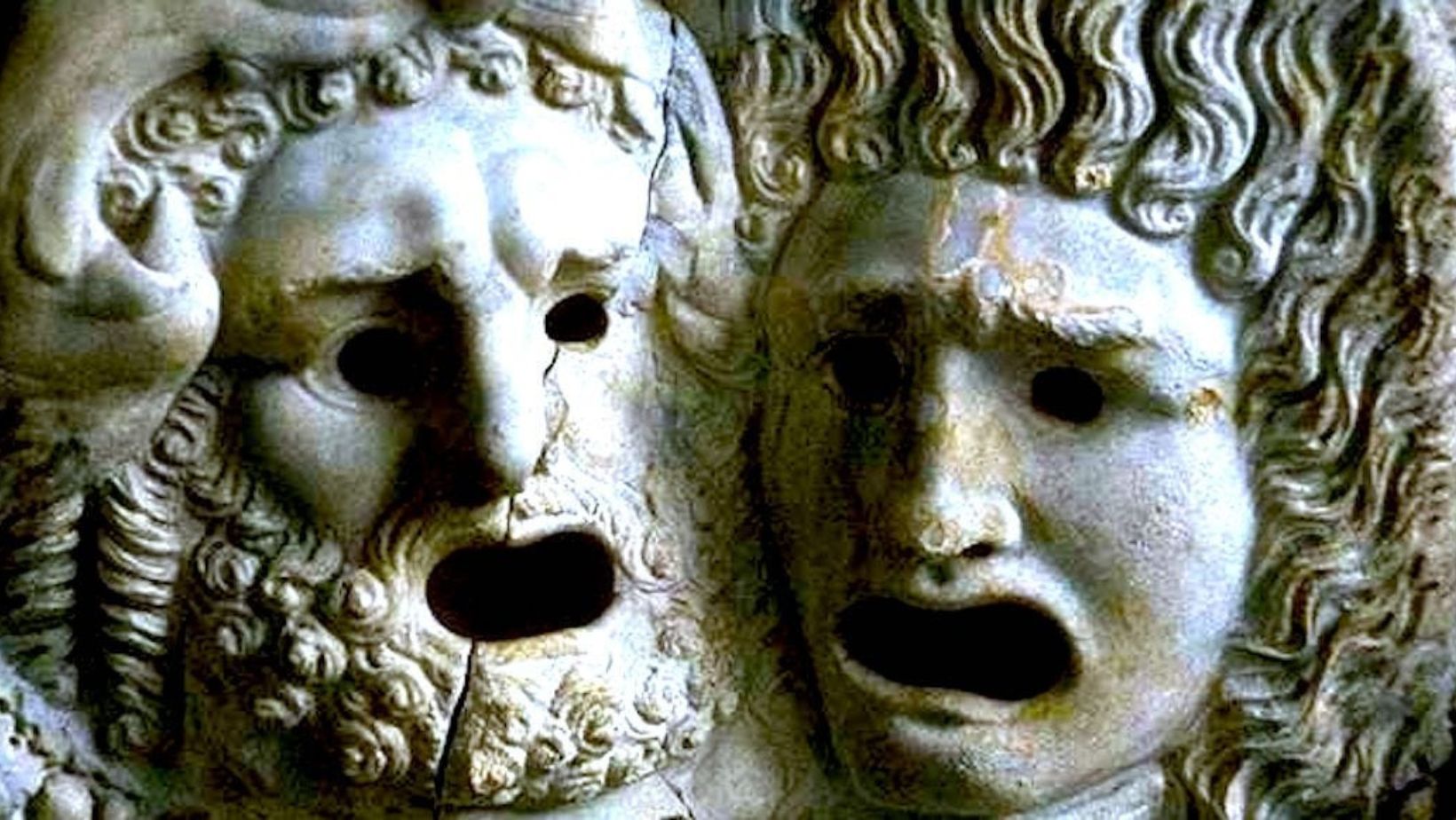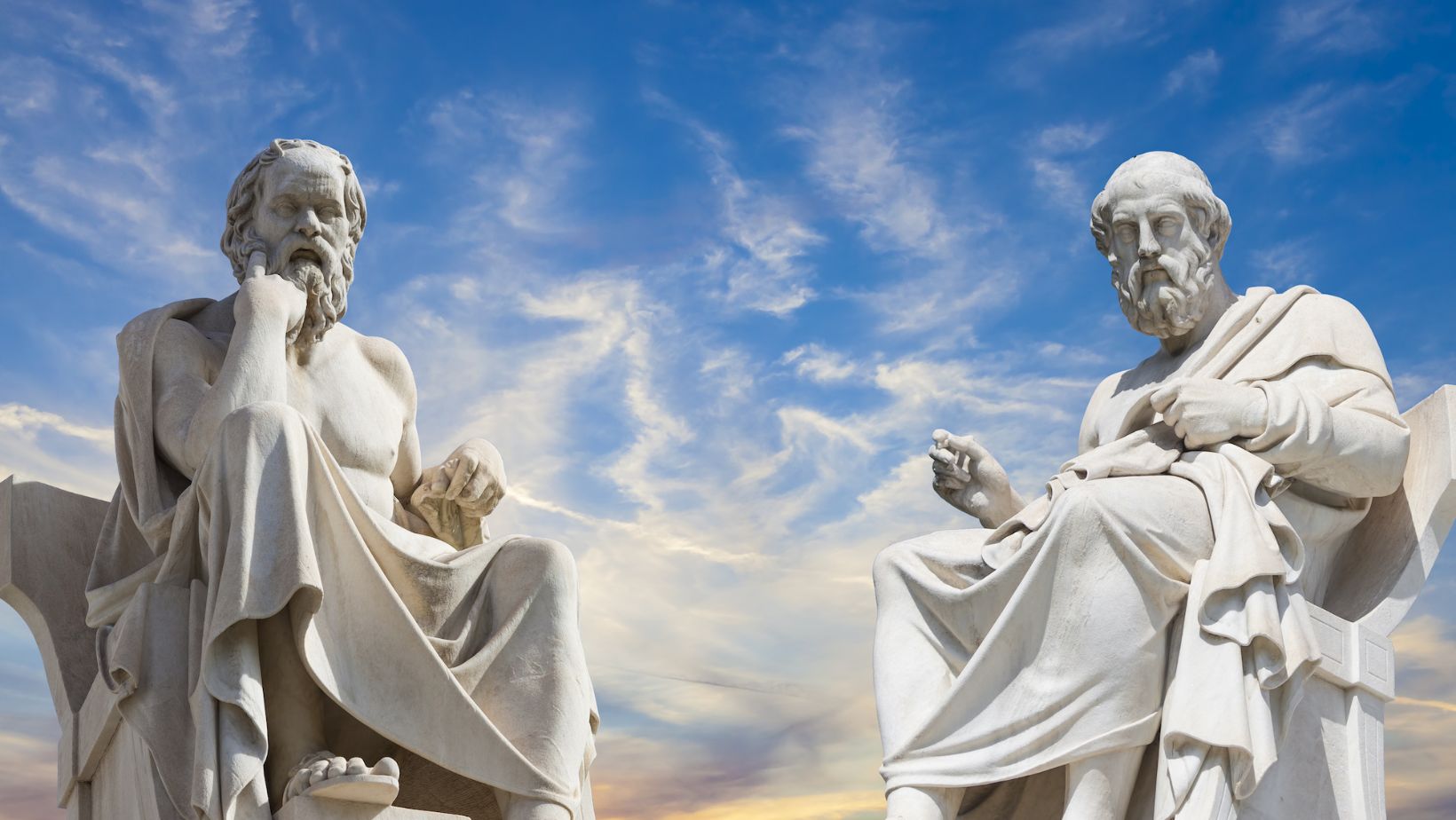When you think of ancient Greek luminaries, Euripides and Socrates likely come to mind. These two figures might seem worlds apart – one a playwright known for his tragic dramas, the other a philosopher famous for his method of inquiry. Yet, their paths crossed in ways that left an indelible mark on history. Digging into the connection between a playwright who stripped down human emotions to their core and a philosopher who dared to question everything we take for granted is more than just interesting—it’s key to getting what Western thought is all about.
Table of Contents:
- The Relationship Between Euripides and Socrates
- Euripides’ Portrayal of Women and Societal Norms
- Socrates and Euripides: Challenging Conventional Wisdom
- The Legacy of Euripides and Socrates
- Conclusion
The Relationship Between Euripides and Socrates

Euripides and Socrates were two of the most influential figures in ancient Greece. Though they worked in different fields – Euripides as a playwright and Socrates as a philosopher – their ideas intersected in fascinating ways.
Both men lived in Athens during the 5th century B.C., a time of great intellectual and artistic ferment. They belonged to a group of thinkers who dared to challenge old-school ideas and values, always searching for fresh perspectives to make sense of everything around us.
Euripides’ Influence on Socrates: Euripides and Socrates
According to ancient sources, Socrates was a great admirer of Euripides’ work. The philosopher Socrates reportedly never missed a performance of Euripides’ plays, and he even helped the playwright compose some of his works.
Euripides’ tragedies often grappled with deep philosophical questions about justice, morality, and the nature of the gods. Socrates would have been all over these topics, diving into every detail with his life’s work of poking and prodding at similar questions.
Socrates’ respect for Euripides is evident in Plato’s dialogues. In the “Symposium,” Socrates argues that Euripides is the greatest of the tragedians, surpassing even Aeschylus and Sophocles.
He praises Euripides for his wisdom and insight into human nature. For Socrates, Euripides’ plays were not mere entertainment but a source of profound truths about the human condition.
Philosophical Themes in Euripides’ Plays
Many of Euripides’ plays explore themes that would have been of great interest to Socrates and other philosophers of the time. His characters often grapple with questions of justice, fate, and the role of the gods in human affairs.
In “Medea,” for example, Euripides presents a complex portrait of a woman driven to extremes by passion and a desire for revenge. The play raises questions about the nature of justice and the consequences of unchecked emotion.
Other plays, like “The Bacchae” and “Hippolytus,” examine the conflict between reason and irrationality, a theme that Socrates would later take up in his own philosophy. His works were a rich source of ideas for the philosophers of classical Greece.
Euripides’ Portrayal of Women and Societal Norms: Euripides and Socrates
Euripides was a groundbreaking playwright in many ways, but perhaps most notably in his portrayal of women.
His plays feature complex, multifaceted female characters who defy societal norms and expectations. From the cunning Medea to the defiant Antigone, Euripides’ women are a far cry from the passive, submissive ideal of ancient Greek femininity.
There’s Medea, the scorned wife who brutally avenges her unfaithful husband. There’s Phaedra, consumed by forbidden lust for her stepson. Then there’s Hecuba, Troy’s once-great queen who faces her staggering losses with unmatched grace and resilience.
These women are not mere stereotypes or caricatures. In giving voice to these characters, Euripides challenged the prevailing view of women as inferior and subordinate to men.
Challenging Traditional Gender Roles
Euripides’ plays often subvert traditional gender roles and expectations. In “Medea,” for example, the title character takes on qualities typically associated with masculinity, such as anger, violence, and a thirst for vengeance.
Other stories, such as “The Trojan Women” and “Hecuba,” dive into what life is like for women during the chaos of war. These works give voice to the often-overlooked female victims of conflict, highlighting their suffering and resilience in the face of unimaginable hardship.
Critiquing Athenian Society: Euripides and Socrates
In his plays, Euripides didn’t just tell stories about women; he used their lives to shine a spotlight on the unfairness brewing in ancient Athens’ male-dominated world.
Euripides’ plays really drive home the point that mistreating women doesn’t just hurt them; it shakes society to its core. In works like “Medea” and “The Bacchae,” the repression of female agency leads to chaos, violence, and the breakdown of social order.
Euripides’ plays were a challenge to the sex-gender system of ancient Greece, a system that relegated women to the margins and denied them a voice in public life. By putting women at the center of his works, Euripides forced his audience to confront the humanity of “the other” and to question the assumptions that underpinned their society.
Socrates and Euripides: Challenging Conventional Wisdom
Socrates and Euripides were both known for their unconventional ideas and their willingness to challenge the status quo. In a society that prized conformity and tradition, these two thinkers dared to question the received wisdom of their time.
Socrates was famous for his method of questioning, known as the Socratic method. He would engage in dialogue with his interlocutors, probing their beliefs and assumptions until they were forced to confront the limits of their own knowledge.
Euripides, too, was a master of questioning. His plays often challenged traditional myths and religious beliefs, presenting alternative viewpoints and raising doubts about the gods and their role in human affairs.
Promoting Critical Thinking: Euripides and Socrates
Both Socrates and Euripides sought to promote critical thinking and rational inquiry. They got their audience fired up, urging everyone to take a hard look at what they believe in and to chase after the truth by talking it out and thinking critically.
In Euripides’ play “The Bacchae,” the god Dionysus represents the irrational and the instinctual, while the king Pentheus represents reason and order. The play suggests that both aspects of human nature are necessary and that true wisdom lies in finding a balance between them.
Facing Opposition and Criticism
Socrates and Euripides both faced opposition and criticism for their ideas. Socrates was put on trial and ultimately executed for corrupting the youth of Athens with his unconventional teachings. Euripides, too, was often mocked and derided by his contemporaries, including the comic playwright Aristophanes.
Yet both men remained committed to their principles and continued to challenge conventional wisdom throughout their lives. They viewed themselves as the ultimate stirrers, nudging their peers to dive deeper and think more critically about everything happening around them.
In a sense, Socrates and Euripides were the original “revenge of the nerds,” using their intellect and creativity to challenge the dominant culture of their time. They may have been outsiders, but they used their position on the margins to gain a unique perspective on their society and to push for change.
The Legacy of Euripides and Socrates: Euripides and Socrates

Euripides and Socrates, with their groundbreaking ideas, have left a mark on Western thought that’s still felt today.
His emphasis on reason, self-knowledge, and the pursuit of truth has inspired countless thinkers, from Plato and Aristotle to Descartes and Kant.
Euripides, meanwhile, has had a major influence on the development of Western literature. His plays have been adapted and reimagined by writers and artists across the centuries, from Seneca and Racine to T.S. Eliot and Jean-Paul Sartre.
Euripides’ innovations in dramatic form and technique, such as his use of the deus ex machina and his exploration of psychological realism, have had a lasting impact on the art of theater. He also deserves a shoutout for bringing more women into the spotlight in plays and ensuring those who often don’t get heard – the sidelined and pushed-aside folks – found their voice on stage.
Enduring Relevance in Modern Times: Euripides and Socrates
Euripides and Socrates still catch our attention today because they dive into questions about what it means to be human that never seem to get old. Their ideas about justice, morality, and the nature of the self are as relevant now as they were in ancient Greece.
Euripides’ plays, in particular, have taken on new meaning in light of modern debates about gender, power, and social justice. Works like “Medea” and “The Trojan Women” speak to the experiences of women across time and culture, while plays like “The Bacchae” and “Hippolytus” explore the tensions between reason and emotion, civilization and nature.
Socrates’ philosophy, too, remains a vital force in contemporary thought. His emphasis on critical thinking, self-examination, and the pursuit of truth is more important than ever in an age of fake news, political polarization, and information overload.
Together, Euripides and Socrates offer a model of intellectual courage and integrity that continues to inspire us today. They remind us of the importance of questioning authority, challenging assumptions, and standing up for our beliefs, even in the face of opposition and adversity.
As we tackle today’s problems, ancient philosophers can be our guiding stars, offering wisdom and a dash of inspiration along the way. Their stories show us just how powerful ideas can be and remind us of our own capacity to think, care deeply, and create amazing things.
Key Takeaway: Euripides and Socrates
Euripides and Socrates, icons of ancient Greece, rocked the boat with their bold ideas. While Euripides turned the drama into a platform for questioning norms, especially around women’s roles, Socrates used dialogue to challenge societal beliefs. Together, they pushed Athens to think harder and look deeper into morality, justice, and human nature.
Conclusion: Euripides and Socrates
In our journey through the intertwining lives of Euripides and Socrates, we’ve uncovered more than just historical ties; we’ve found enduring lessons on influence, intellectuality, and innovation. The tale of these two legends shows us that sometimes, the most innovative ideas pop up when you least expect it, especially during team-ups no one saw coming. Whether it was through dialogues in Athenian streets or dramatic performances under starlit skies, they pushed boundaries together.
Their legacy? A world forever enriched by their insights into humanity’s deepest dilemmas – all because a playwright dared to question like a philosopher and a philosopher wasn’t afraid to learn from the arts.

